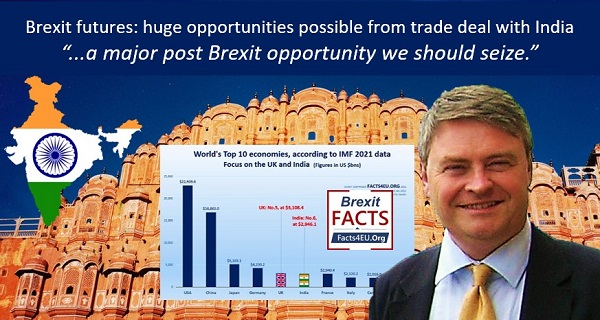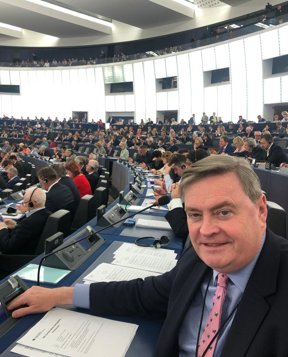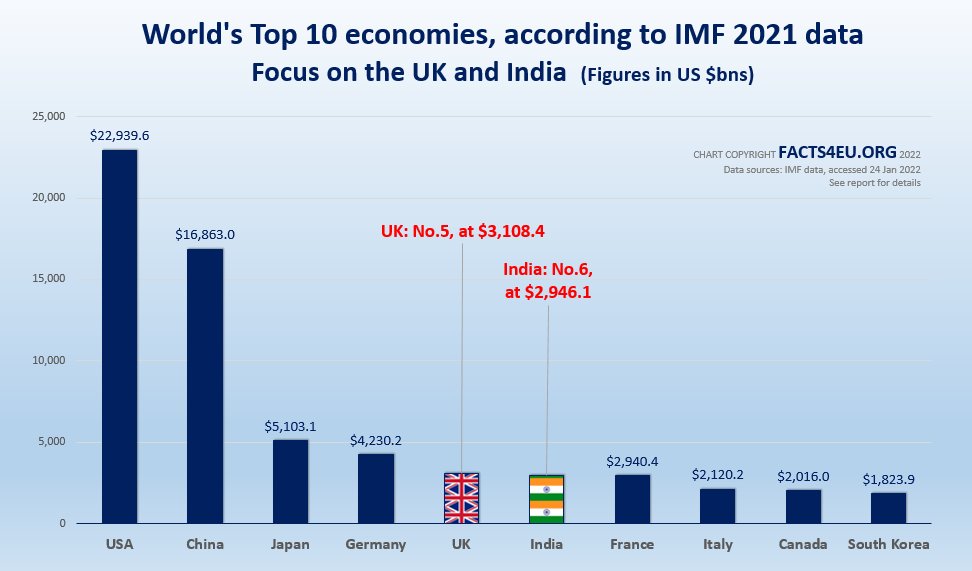Brexit futures: Huge opportunities possible from trade deal with India
First of an occasional series looks at international prospects for prosperity thanks to Brexit

Montage © Facts4EU.Org 2022
As the post-Brexit era opens up for the UK we shall be taking an occasional look at some of the opportunities that are there for the taking if the UK Government and the British people apply their talents to deliver change. Today, with the help of former MEP David Campbell Bannerman, who takes a special interest in India, we are looking at what a Free Trade Agreement (FTA) with India might mean for both countries.
A UK-India Free Trade Agreement will be an important step in achieving the Government’s aim of establishing FTAs covering 80% of UK trade by the end of 2022. According to the IMF's figures for 2021, India is now the World's 6th-largest economy, just behind the UK at No.5. France now trails in 7th place. At current growth rates India is expected to overtake the UK this year.
Brexit Facts4EU.Org Summary
Interview with David Campbell Bannerman
“The benefits of a UK-India Free Trade Agreement – as long term historically linked partners, with close and meaningful language, legal and cultural links, and with similar-sized economies today – are potentially substantial and highly beneficial, perhaps even transformative.
The ability of the UK to hitch its star to what will become the second largest economy in the world in future, and work together via CPTPP is a major post Brexit opportunity we should seize.”
David Campbell Bannerman, speaking exclusively to Facts4EU

David Campbell Bannerman was born in Bombay (Mumbai) and his father in Calcutta (Kolkata). He is a former MEP from 2009-19 for East of England, serving on the European Parliament International Trade Committee 2009-19; including as Standing Rapporteur on the proposed EU-India Free Trade Agreement and meeting Prime Minister Modi twice in this role.
The Indian population
India has successfully reduced absolute poverty from 21.6% in 2011 to 13.4% in 2015. India’s middle class is also growing fast – it is half the EU’s population and is set to overtake the United States in terms of expenditure before 2030 to become the second-largest middle-class market in the world; one suitable for more luxurious British brands.
Britain’s population of 67 million compares to India’s 1.37 billion, but India’s is significantly younger: with only 6.6% of the population aged 65 or older in contrast to 19% for the UK and 9.3% for the world as a whole.
The current trade landscape
Trade grew from 2011 to 2019, but mainly in UK imports, with goods and services received from India up by 51% from £9.8 billion to £14.8 billion whilst UK exports increased only 3% from £8.2 billion to £8.5 billion.
Already, the UK and India are among the top investors in each other’s economies, bringing long-term benefits to both. Think of Indian owned Jaguar Land Rover and Tetley Tea (Tata), Cobra beer (Lord Bilimoria), Norton Motorcycles (TVS), and the conversion of the old War Office in Whitehall (gazed down upon by James Bond in Skyfall) into luxury hotel and apartments (the Hindujas). FTAs always benefit Foreign Direct Investment (FDI) too, following on from closer relations.
Brexit Facts4EU.Org Summary
UK's and India's economies - World's Top 5 and Top 6
- USA: $22,939.6
- China : $16,863.0
- Japan : $5,103.1
- Germany : $4,230.2
- UK : $3,108.4
- India : $2,946.1
- France : $2,940.4
- Italy : $2,120.2
- Canada : $2,016.0
- South Korea : $1,823.9
© Brexit Facts4EU.Org 2022 - click to enlarge
Source: IMF data, accessed 24 Jan 2022
The UK exports more in goods (54%) than services (46%) to India currently – in marked contrast to services exports to the USA and EU for example, where the ratio is reversed with greater emphasis on services – suggesting the export of services to India has huge potential. UK investment into India reached £15.3bn in 2019, whereas Indian Foreign Direct Investment into UK increased to £11.6bn between 2017 and 2018.
A note by the UK’s Department for International Trade has stated, “[India’s] growing middle-class is expected to spend more on services (such as healthcare and education); seek premium offerings and new product categories (such as organic food); and have consumption preferences significantly driven by digital connectedness – trends that are likely to benefit UK businesses.”
The challenges and opportunities that India presents
India is very protectionist. The UK’s average import tariffs on Indian goods is around 4.2%; but India’s is 14.6% on UK goods, so there is much opportunity to balance out tariffs or cut to zero per cent. India has substantial, even eye watering, tariffs on luxury goods – up to 150% on luxury cars and 150% on Scotch whisky. In attempting to negotiate an FTA with the EU, India feared the larger German car and mechanical equipment manufacturers – but sees the UK as less of a threat – and, helpfully, Jaguar Land Rover is Indian owned.
The UK offers great expertise in energy equipment for example and mechanical machinery is a big UK export now – JCB is a great success story for UK and India. In defence, with the common threat of China building a massive military, India and the UK could be natural partners in developing common warships, military aircraft, tanks and troop vehicles.
As well as luxury goods the UK is also well placed to offer services, the markets for both being likely to grow alongside India’s middle class. FTAs can help break down barriers to trade such as excessive bureaucracy – some of which we gifted to India, but which India has often gold plated with over-the-top licensing and technical requirements. Business services, especially legal, insurance, accounting and management consulting services could be a natural for the UK and the City of London, especially as India and the UK share the same common law legal basis.
What can the UK offer?
Indians are very exercised at tariffs and quotas on Basmati Rice, which could easily be lifted, reducing costs for our favourite curry restaurants and supermarkets. Mango imports became a cause celebre under ill-thought-through EU barriers – so tariffs could be eased. Textiles and clothing could see cuts to EU-style tariffs, reducing costs to consumers. Again, there are many proud Indian owners of textile mills in the UK who could benefit using lower textile costs in India. These bonds can be built upon.
The UK could allow Indian students – who are genuinely studying – to stay on and work after graduating at our universities. Britain is losing many major future entrepreneurs and billionaires to Silicon Valley – with reports that 40% of Silicon Valley is now run by Indian entrepreneurs. This could benefit the UK’s growing Tech industries (reported by Facts4EU last week). The aim would be manageable numbers, especially through post-Brexit controls and high wage visas, and offering real long-term benefit to our universities and economy.
A Mutual Recognition Agreement on professional services, such as for doctors, architects, midwives and nurses might be a possibility, as in the UK’s Canadian, Australian and New Zealand agreements. India and the UK already share far more common training standards than it had through the EU with, say, Romania or Bulgaria.
Observations
The potential of a Free Trade Agreement with India is immense. The prospects of the UK being able to pull off a deal are promising – and in direct comparison to the lamentable failure of the EU. Former UKIP and later Conservative MEP, David Campbell Bannerman served as the European Parliament’s Rapporteur on the EU-India trade agreement negotiations and could see that after twelve years nothing was accomplished. The UK can be more nimble and dynamic and look after its own interests rather than be held back by the concerns of the other member states that would have their own objections .
Geo-political issues – mainly due to the ambitions of China – are also pointing to closer co-operation with India and we can look to how the UK and India collaborated on Vaccine development and production during the Covid Pandemic – an encouraging sign of partnership.
With the size of India – and especially the growth of its middle classes – being so large the UK Government should give this trade deal its top priority, especially as the political urgency for a deal has cooled in Washington since Joe Biden became US President. Indian politicians are not interested in the Good Friday Agreement and the Northern Irish Protocol and are not looking to leverage the UK against its own interests in retaining its sovereignty across the whole country – any deal with India will be a commercial one, not a political one seeking to harvest the Irish American vote for US elections.
So Godspeed Anne-Marie Trevelyan – if you can secure an ambitious Free Trade Agreement with India your political star would surely rise even higher than that of Liz Truss.
Facts4EU.Org needs you today
We are a 'not for profit' team (we make a loss) and any donation goes towards the actual work, not plush London offices, lunch or taxi expenses, or other luxuries of some organisations.
We badly need more of our thousands of readers to donate.Could this be you, today?Maybe you've been thinking about it, but just haven't got around to doing it?If so, let us reassure you.It's quick and easy and we use two highly secure payment providers.And we do NOT ask you for further donations if you donate once - we just hope that you keep supporting us. Your donation stays anonymous unless you tell us otherwise.
Please don't assume that other people will keep us going - we don't receive enough to survive and we need your help today.Could you help us?
Most of our readers are well-informed and appreciate our fact-based articles, presented in a way you won't see anywhere else. If you value reports like the one above, please help our work with a donation. We have far more to do in researching, publishing, campaigning and lobbying Parliament than we have in terms of the financial resources to fulfil these tasks. We badly need funding to continue - we rely 100% on public donations from readers like you.
If you believe in a fully-free, independent, and sovereign United Kingdom, please make a donation now. It’s quick, secure, and confidential, and you can use one of the links below or you can use our Donations page here. You will receive a personal, friendly ‘thank you’ from a member of our team within 24 hours. Thank you for reading this.
[Sources: Interview with David Campbell Bannerman | IMF GDP figures ] Politicians and journalists can contact us for details, as ever.
Brexit Facts4EU.Org, Monday, 24 January, 2022
Click here to go to our news headlines
Please scroll down to COMMENT on the above article.
And don't forget to actually post your comment.
Since before the EU Referendum, Brexit Facts4EU.Org
has been the most prolific researcher and publisher of Brexit facts in the world.
Supported by MPs, MEPs, & other groups, our work has impact.
We think facts matter. Please donate today, so that we can continue to ensure a clean Brexit is finally delivered.
Paypal Users Only - Choose amount first
Quick One-off
Monthly



Something to say about this? Scroll down for reader comments